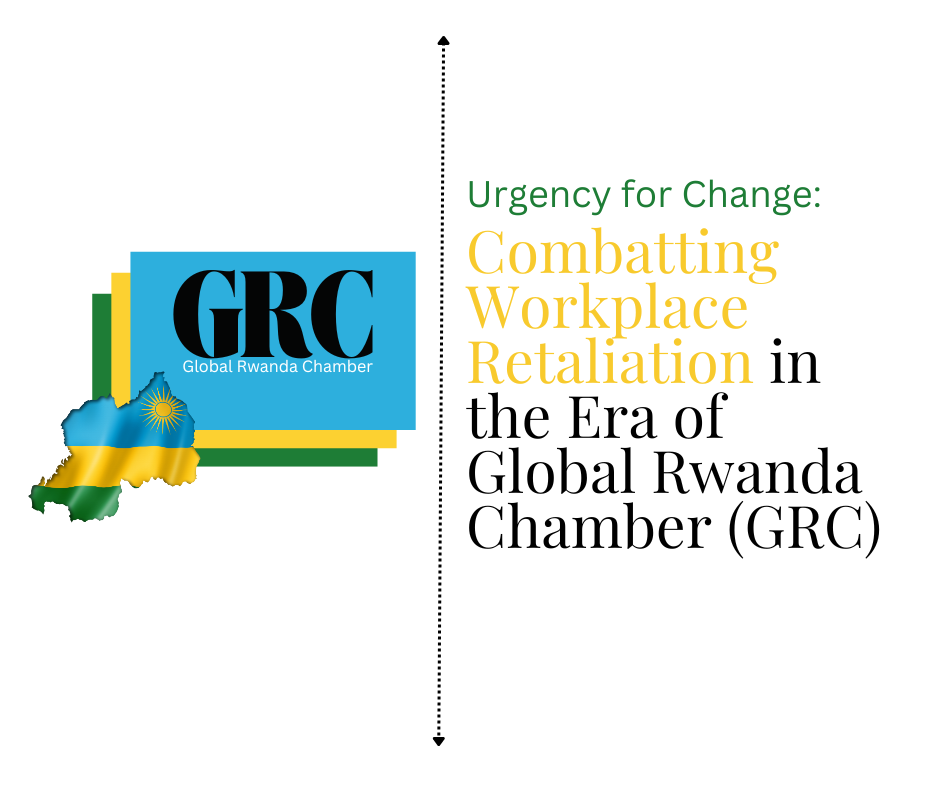In the dynamic landscape of the Global Rwanda Chamber (GRC), addressing workplace retaliation is not just a legal or ethical obligation but a crucial element in ensuring sustainable growth, innovation, and employee well-being. Here, we delve into the specific actions that can be taken within the context of GRC to combat retaliation, emphasizing the urgency for change and the emotional impact on employees.
The Context of GRC:
As a pivotal entity in Rwanda’s economic development, GRC sets the tone for ethical practices, inclusive growth, and employee empowerment. However, like any organization, GRC must remain vigilant against the insidious threat of workplace retaliation, which can erode trust, hinder progress, and damage its reputation.
Actions Against Workplace Retaliation in GRC:
- Leadership Commitment: At the forefront of combating retaliation is strong leadership commitment. Leaders within GRC must vocally and visibly endorse a zero-tolerance policy towards retaliation, demonstrating that ethical conduct and employee rights are non-negotiable values.
- Enhanced Policies and Procedures: GRC should continuously review and enhance its policies and procedures related to retaliation. This includes clearly defining what constitutes retaliation within the organization, establishing multiple reporting channels, and ensuring swift and fair investigations into any allegations.
- Empowering Employees: Educating and empowering employees within GRC is paramount. Training programs should not only educate employees on their rights but also provide practical guidance on how to recognize, report, and prevent retaliation in the workplace.
- Cultural Transformation: Beyond policies and procedures, GRC must foster a culture of openness, transparency, and accountability. This involves promoting constructive feedback mechanisms, encouraging dialogue on ethical dilemmas, and celebrating instances where employees speak up against wrongdoing.
The Emotional Toll and Urgency for Change:
Emotionally, workplace retaliation can have profound effects on employees within GRC. It breeds feelings of fear, isolation, and disillusionment among those who witness or experience retaliation. This emotional toll not only impacts individual well-being but also undermines collaboration, innovation, and the overall organizational climate.
Why Urgency Matters:
The urgency to combat workplace retaliation within GRC cannot be overstated. By addressing retaliation swiftly and decisively, GRC not only protects its employees but also strengthens its reputation as a responsible corporate citizen committed to ethical practices and employee welfare. Moreover, by fostering a retaliation-free environment, GRC enhances its attractiveness as an employer of choice, attracting top talent and retaining skilled professionals who contribute to its long-term success.
Conclusion:
In conclusion, combating workplace retaliation within the Global Rwanda Chamber (GRC) requires a multi-faceted approach that combines robust policies, proactive leadership, employee empowerment, and a commitment to cultural transformation. By taking these actions urgently and decisively, GRC not only fulfills its legal and ethical obligations but also cultivates a workplace where integrity, respect, and collaboration thrive, paving the way for sustained growth and positive impact in Rwanda’s business landscape.





